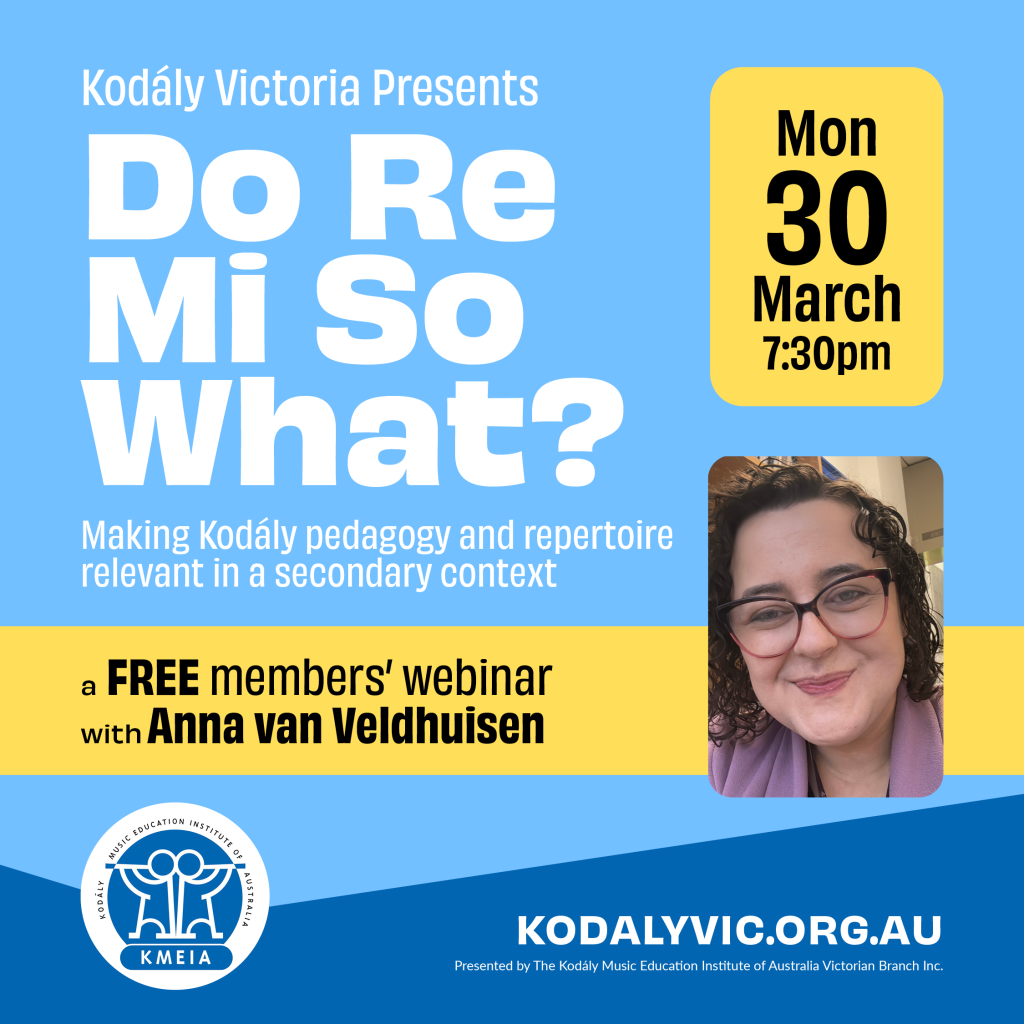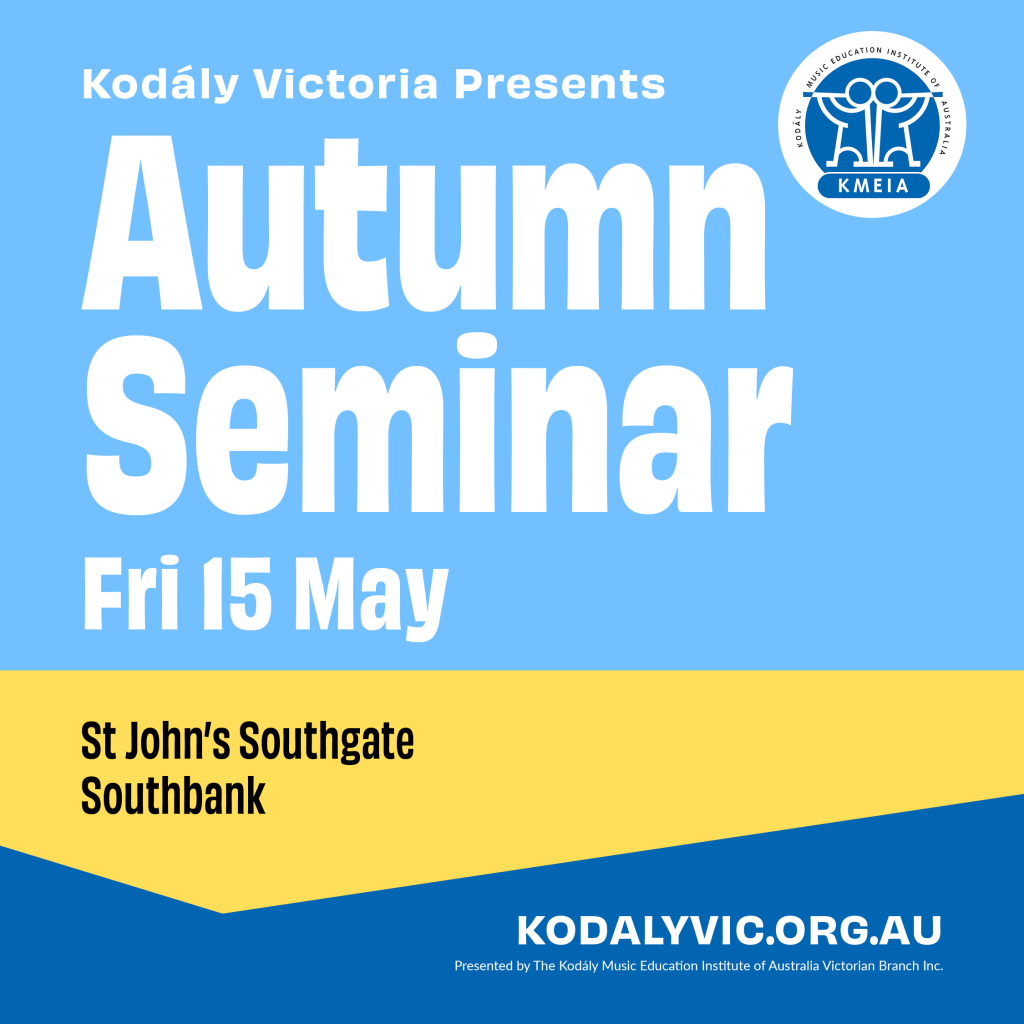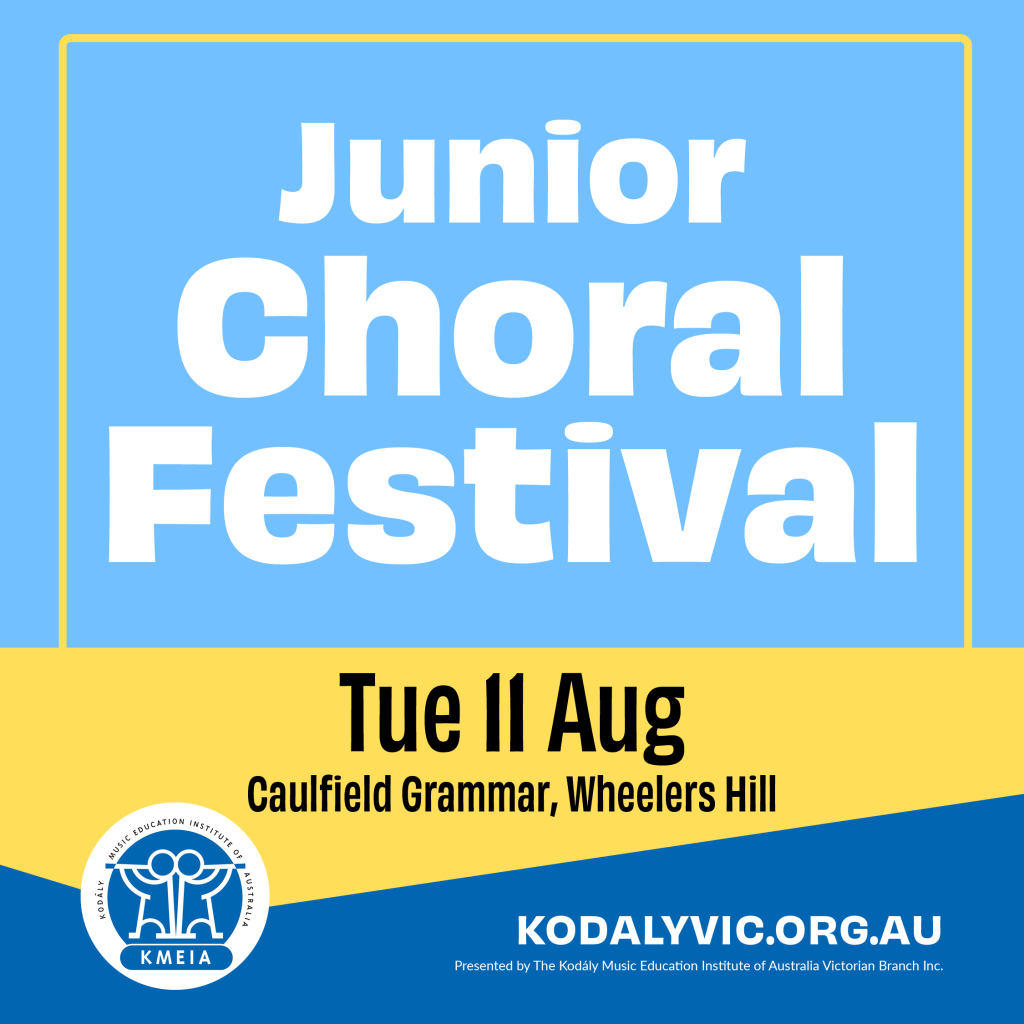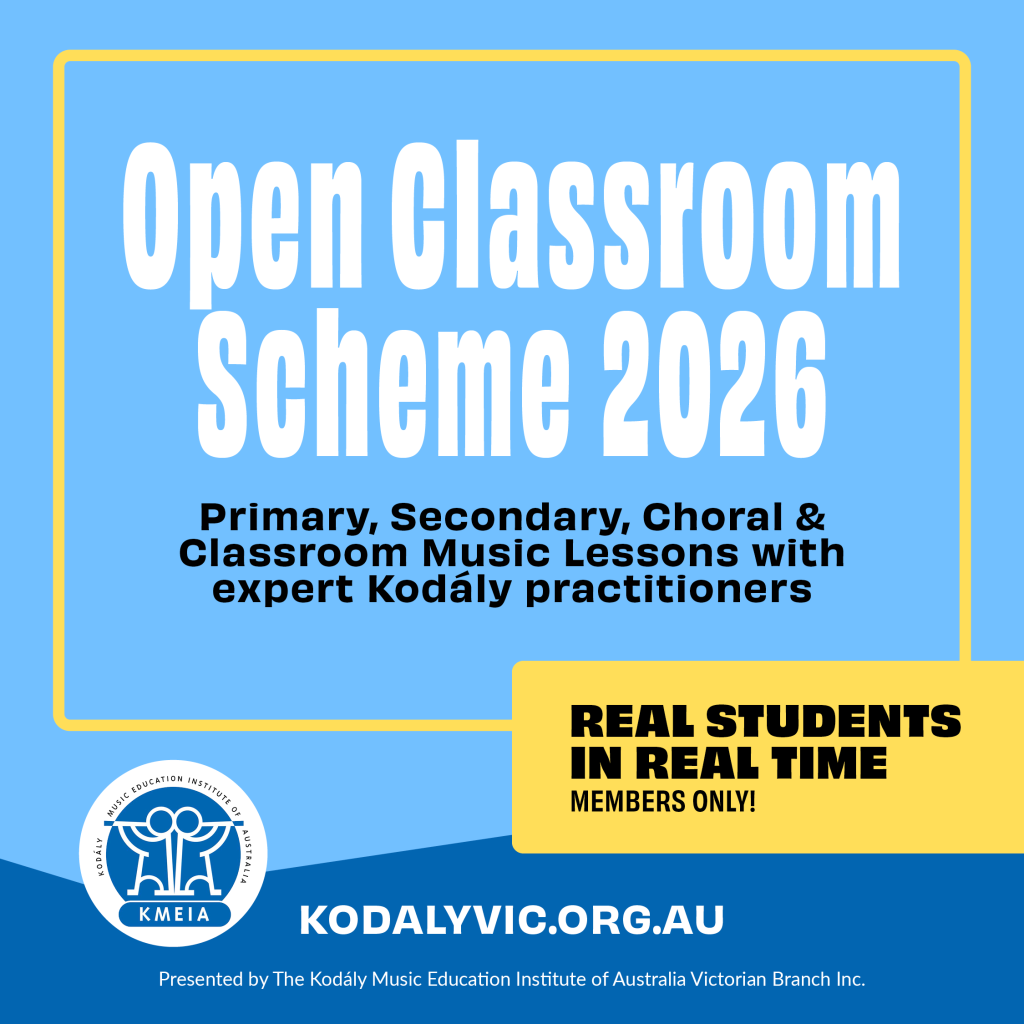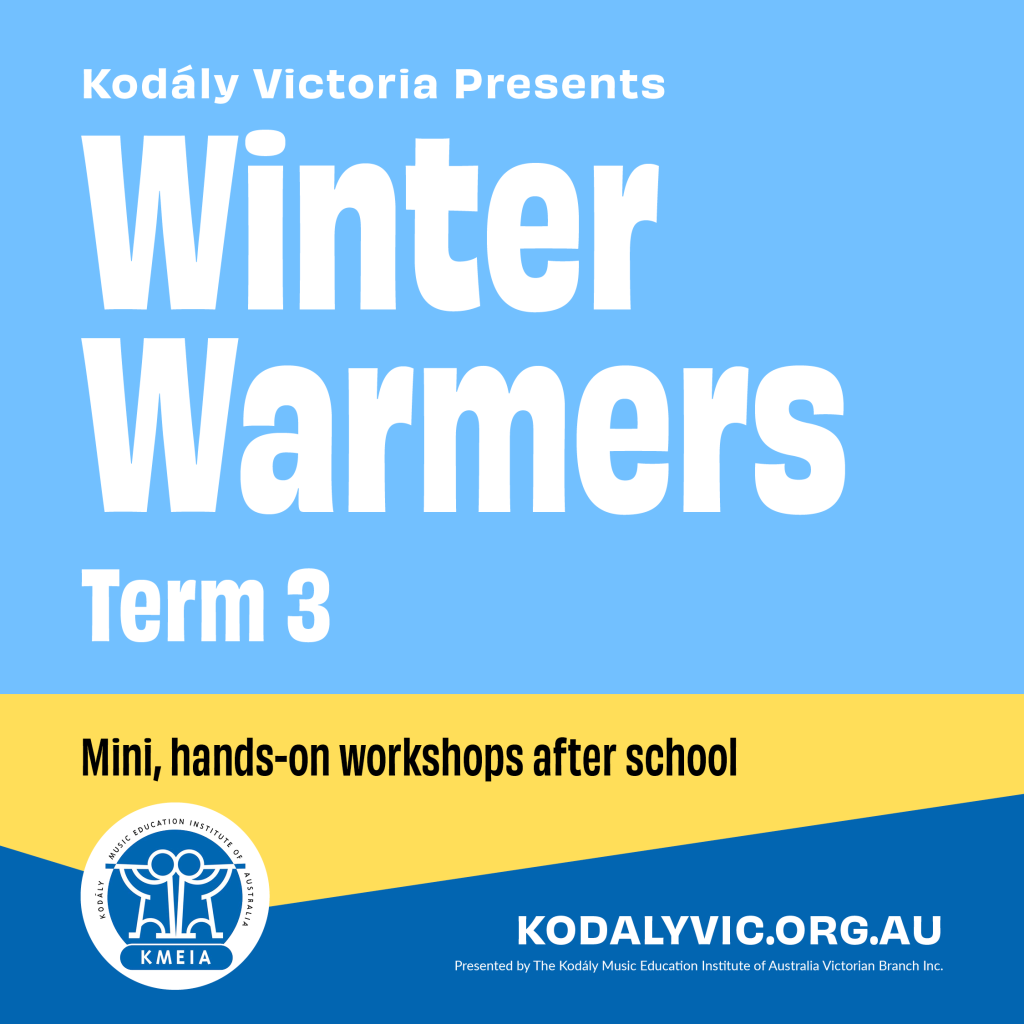Due to unforeseen circumstances, we have made the difficult decision to cancel Autumn Seminar.
We will be in touch with everyone who has registered to arrange refunds.
The committee is currently working to secure other exciting professional learning opportunities in terms three and four. We are also busy working to bring you the next Kodaly Australia Conference in Melbourne / Naarm from 23rd to 26th September 2024. We will have news about this event soon! Put the dates in your diaries now!
Thanks for your ongoing support of Kodaly Vic.
Friday 12 – Saturday 13 May 2023
Preparations for the 2023 Autumn Seminar are underway! We haven’t run an Autumn Seminar since 2018, so put these dates in your diary now! The Kodaly Vic Autumn Seminar has established a reputation for providing outstanding professional development for music educators. The seminar will enrich your teaching by providing access to excellent practitioners and innovative resources adapted for Australian classrooms. Choose from a range of workshops designed to take your skills to a higher level in musicianship; aural training; teaching materials; choral repertoire and Kodaly pedagogy.
Dates: Friday 12 and Saturday 13 May 2023
Location: Hawthorn Arts Centre, 360 Burwood Road, Hawthorn
Keynote Presenters: Jarrod Schindler, Carla Trott
Session Presenters: Ruth Friend, Renee Heron, Juliana Kay, Stefania Miller, Elizabeth O’Leary, Peta Rust, Alex St Vincent Welch, Rowena Tall, Anna van Veldhuisen, Thomas Williams
Advanced Musicianship Presented by Carla Trott Looking to challenge yourself and work your musicianship brain? In advanced musicianship we will explore a range of repertoire with shifting modalities, metres and moods.
Early Years Methods Presented by Elizabeth O’Leary In this session we will explore how to engage children aged 3-5 in music-making and lay a strong foundation for their musical development. We will explore a range of repertoire and activities and learn how to foster musical ‘readiness’ skills in preschool age children. We will also discuss the importance of music education in the early years (including for babies and toddlers), and the role of the teacher in an early childhood setting. This session is for teachers working with preschool children in schools or community settings.
Middle Primary Methods: Music for all seasons Presented by Carla Trott These sessions will focus on repertoire and skill development for students in Years 4-6. Participants will explore practical ways to engage all students and to authentically cultivate the “Talents of a Musician” (McPherson and Williamon, 2015).
Musical Manipulatives: A hands on, inclusive approach to teaching music literacy Presented by Stefania Miller A manipulative is anything a student can put their hands on to assist them in developing and learning a new concept. This session explores songs, games and practice activities that include concrete objects to manipulate as well as why they are useful for creativity and inclusivity in the music classroom.
Compulsory Year 7 music – a spring board for your school musical culture Presented by Thomas Williams How can we, as music educators, use the greater social and emotional aspects of our subject to both engage and enthuse learners for our subject, who otherwise might not see themselves as musicians? What non-musical traits can we grow in our students through the practice of music in our classrooms? In this session, I will discuss examples from Richmond High School, and look at how we try to use the compulsory music program to help students create musical identity who might not otherwise see themselves as such. We will also look at what opportunities exist within these compulsory programs to help develop in students leadership capacity, whilst incorporating both Kodaly and informal musical pedagogies.
Celebrating our Diverse Classroom Communities: Songs, Games & Dances from around the world Presented by Rowena Tall
One of the main pedagogical principles in the Kodaly approach is the use of repertoire from the “musical mother tongue” of the students, that is their own folk music. This forms the starting point for musical learning which eventually leads to an understanding of and appreciation for music of all styles, genres, and cultures.
The world in which we live and teach is a very different one to the world Kodaly inhabited and as such the principle of beginning with the ‘musical mother tongue’ has become challenging.
In this session we will discuss these challenges and explore ways of celebrating the diverse ethnicities represented in our classrooms through the inclusion of authentic repertoire from around the globe.
Embedding First Nations Perspectives and Allyship in our Music Programs Presented by Renée Heron
“At its heart, reconciliation is about strengthening relationships between Aboriginal and Torres Strait Islander Peoples and non-Indigenous peoples, for the benefit of all Australians.” – Reconciliation Australia
The 2023 National Reconciliation Week theme is ‘Be a Voice for Generations.’ This year’s theme encourages all Australians to be a voice for reconciliation in tangible ways in our everyday lives, and for us as music teachers, this means our classrooms and ensembles. As a non-Indigenous educator, Renee will share repertoire, activities, and experiences that she uses in her music classroom and choral programs to uplift First Nations voices, people and perspectives. Renee will also discuss how we can embed these perspectives in a respectful and sensitive way while encouraging educators to continually strive to improve their practice one conversation at a time.
Celebrating language and cultural diversity in a Songbook Project Presented by Carla Trott Reflections on culturally responsive pedagogy in an integrated music and literacy program
From polyphony to punk and funk: syncopation and diverse rhythmic repertoire in the secondary classroom Presented by Anna van Veldhuisen The new VCE music study design encourages us to link the listening, performing, and composing aspects of our curriculum in more integrated and creative ways. As students move into the upper years of secondary school, how can we keep ta, titi, and tikatika musically engaging and authentic? In this workshop, Anna will share a range of activities, repertoire ideas, and materials for the secondary classroom aimed at improving students’ rhythmic skills and understanding. Diversifying our repertoire is of central importance as we move to more culturally responsive teaching, and so excerpts used will focus on local Australian artists of a variety of styles, First Nations composers, and women. Strategies for approaching ties, irregular metre, and syncopation will be explored: a particular area of interest for Anna as a percussionist turned Kodály-inspired classroom teacher!
Strategies to Successfully Integrate Creative Movement into your Primary Music Program Presented by Ruth Friend Movement within a music program serves many functions. It encourages mindfulness, kinesthetic understanding of musical concepts, focus, ability to work with others, sensitivity to music, listening skills and of course music appreciation. Creative Movement requires well-established parameters and classroom rules along with the development of a vocabulary/repertoire provided by the teacher. Establishing a sequential plan for the introduction and development of movement skills ensures success, enjoyment and above all sensitive, creative young musicians.
‘I’m New, What Do I Do?’ Differentiation in Upper Primary Presented by Peta Rust How many times has a student approached you at the start (or any point) of your class and said ‘I missed last lesson’, ‘I’m new’, or even ‘I don’t get it’? In differentiated instruction, teachers are encouraged and empowered to react to each child’s learning in the moment, and change their course depending on that need. We will take a deep dive into differentiation in the Music classroom and unpack how to be rigorous, relevant, flexible, varied and complex to enable us to reach and teach all learners.
20(ish) Ways to Teach a Song: for choirs and classroom singing Presented by Juliana Kay Learning a new song should be an exciting experience for students, one which leaves them hungry for more. If we approach songs creatively and strategically, we can get students excited about all kinds of repertoire through sparking their interest and giving them early feelings of success. In this interactive session, Juliana will outline and demonstrate many different ways to teach songs, from short classroom songs to complex choral works, and make links to vocal technique, musical literacy and style.
It Starts with a Song: listening and composing with folk songs in art music Presented by Alex St Vincent Welch We’ll unpack, decode, and other fancy educational terms, a whole heap of listening examples that are content-rich and dense with elements you use in your Kodály-inspired learning from orchestral and chamber works, to film scores and jazz. We’ll investigate how musicians and composers have been inspired by folk music and how they have used these as inspiration for their own music. These works are excellent models for creativity and composition for our students and present ways to incorporate and build on other ideas.
Curiosity, Connection and Community: linking the music classroom to the world outside Presented by Rowena Tall Who was Little Tommy Tucker and did he get his dog back?? What’s a chariot and why is it ‘Good News’? Where might it be heading? Our rich repertoire of classroom songs both old and new tell many stories from particular times and places in history and can provide a springboard for curiosity and imagination if we take a moment to look beyond the ‘musical outcomes’. In this session we will look at this rich vocabulary of curiosities and look at simple ways of provoking thought, imagination and wonder in the music classroom. We will also look at how this can be a vehicle for making connections with the world outside and inspire an appreciation for the value of music as a communication tool across times and cultures past and present.


